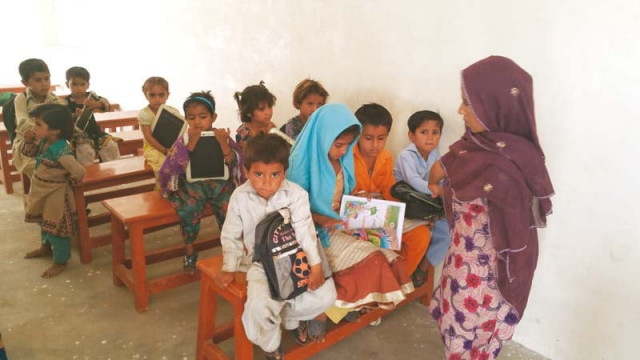First all-girls school in Bittra: Desert rose
A Thari woman’s love for education drove her to establish the first girls school in her village

Hasna Umrani established the first girls school in Bittra village, Tharparkar in 2011. PHOTO CREDIT: ABDUL HALEEM SOOMRO
Hasna was always a responsible child, diligently doing daily chores. Her father Makhan had taken her to school one day but the headmaster refused to give her admission on the basis of her disability. “Being the fifth of six siblings, I often felt envious of my siblings who went to school,” says Hasna. Undeterred, she was adamant to acquire an education through her sister Niyamat and brother Liaquat.
Cradling the chalk between both arms, Hasna’s love for all things literary soon bore fruit. She learnt to read and write at a younger age compared to the rest of the family. Seeing Hasna’s passion for education, her father decided to give another shot at getting her admitted to the school where she had been denied admission earlier. This time though, the school staff was amazed at her literary skills and readily accepted her. “After successfully completing her primary education, Hasna enrolled at a government school in a village named Akliyon. There, she completed middle school,” shares her brother Liaquat. Fraught with financial problems, however, Hasna could not finish high school and had to discontinue her education. Her dream of graduation is yet to be realised.
However, not all her dreams are unfulfilled. Villager Manthar says Hasna spoke to locals and shared her desire to educate girls. “After having a number of meetings, Hasna established a thatched school called Landdhi at her own residence,” he says, adding that now she is seen as a role model in her community.
Impressed by her venture, Canadian philanthropist Abdul Hameed helped Hasna establish two classrooms along with a bathroom for the 30 girls studying at the school. Hasna also managed to get course material from the funds provided to her. Presently, one of the classrooms functions as a vocational centre where girls are taught needlework for free. To support her family, Hasna also does embroidery work at home to sell in the market.
Another member of her community, Allah Bux Hajam says Hameed named the school ‘Insaf Girls School Bittra-Chelhar’, putting up a panaflex bearing Pakistan Tehreek-e-Insaf chief Imran Khan’s picture holding the World Cup won in 1992. Hasna’s family wanted to name the school after her grandfather Chatoo Khan, but decided to go with Hameed’s suggestion over the fear of losing funding. According to Hajam, the school’s name has sparked a political debate in the village, which has traditionally been the stronghold of Pakistan Peoples Party and the Arbab group.
Lauding Hasna’s initiative, political activist Suleman Rahimoon says her efforts are especially commendable keeping in mind the phenomena of ghost schools and ever-absent, incompetent teachers who still manage to draw handsome salaries. Hasna’s project may appear to be modest, but it has had a significant impact in Tharparkar district where female literacy has always been abysmal. Now, the girls can dream and Hasna is making sure these dreams are not swept away by the harsh desert wind.
Abdul Haleem works as a social activist and freelance journalist.
Published in The Express Tribune, Sunday Magazine, May 10th, 2015.



















COMMENTS
Comments are moderated and generally will be posted if they are on-topic and not abusive.
For more information, please see our Comments FAQ